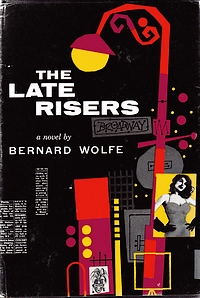
Excerpt
Biff Jordan got into the movies because he was skinny, women made him nervous, and it’s cold in Alaska. All during the war he was stationed in the Arctic Circle way north of the Kotzebue Sound, sending up meteorological balloons and catching them when they came down. He was a rangy boy from the Panhandle, elongated but with no insulating meat on him, and there among the tundras and inching glaciers and machete winds he felt he was doing duty in a mortuary icebox. Dressed in mackinaw and ear muffs, he went around the weather camp with his teeth doing a dice click, saying to everybody, “Boy, here is where the zero gets absolute. My cornflakes taste like dry ice in the morning.” He dreamed of orange groves in California.
California became a sirocco vision to him, some Eldorado of British thermal units. When he got his discharge papers he made tracks for Laguna Beach, where he landed a job as carhop in a drive-in beanery. He tended to be shy, and the brassy klieg sun made him even more self-conscious, especially when there were lady customers around: he was almost thawed out but he felt naked.
One day a cerise Cadillac convertible drove up. The man at the wheel wore smoked glasses and a purple knubby tweed jacket, and the woman with him had jet-black fingernails and green-tinted hair. They both ordered nutburgers on toasted English muffins and lemon frosts, and as they ate they stared at the young lath-lean Texan. He couldn’t leave his station, but he was uncomfortable: he shifted from foot to foot, scratched himself in various places, wondered if his fly was unbuttoned.
“You thinking what I’m thinking?” the man finally asked.
“Six ways from Sunday,” the girl said.
“That,” the man said, “is a shitkicker. Does calisthenics every time you look at him.”
“That’s a shitkicker to end shitkickers,” the girl said.
“Even his eyeballs blush,” the man said. “You look at him, his hands get like windmills. That’s a shitkicker for the connoisseur. That’s a shitkicker’s shitkicker.”
“He introduces an entirely new dimension into shitkicking,” the girl said. “With him it becomes an art form, like ballet.”
“That,” the man said, “is shitkicking like Shakespeare would do it. Odets. De Mille.”
Their conversation puzzled Biff: they sounded like scientists trying to classify a bug.
“Good feature,” the girl said. “Like Ty Powers.”
“More along the Cooper lines,” the man said. “High pockets, pelvis like a Yale lock, and plenty of malnutrition. The cheeks caved in fine.”
“What are we waiting for?” the girl said.
“Boy!” the man called out.
Things happened fast after that. Dark Glasses said his name was Sid — he was a Hollywood agent and how would Biff like a screen test? Biff replied that he wouldn’t care to test any screens because he didn’t have any house to put them in.
Review
- • Commentary magazine, November 1955
- The Late Risers is all about Broadway-show girls, call girls, con men, publicity agents, actors, actresses, marijuana salesmen and consumers, columnists, their ghosts, and other meshuggene…. These characters are linked together in a fantastic plot that operates for seventeen and one-half hours of a single day, at the end of which their masks are lifted, and true natures established.
- • Broadway columnist Billy Rose paid Wolfe the ultimate compliment of giving The Late Risers a prominent mention in his column (from 30 June 1954):
- The other night … I read a book which does the job for me. It’s a new novel entitled The Late Risers, written by Bernard Wolfe with a tommygun in one hand and a bottle of acid in the other.
In what he calls a “midtown mezzotint,” Wolfe puts the microscope on a two-bit press agent named Mort Robell, whose office is in his pork-pie and who operates out of a drugstore phone booth. He argues, and I agree, that though Mort is a marginal stumblebum, he’s pretty much the spirit of the whole communications-fixing industry. The Broadway woods, Wlfe maintains, are full of professional magpies who figure that, “since reality isn’t newsworthy enough, it has to be stage-managed…. Under their auspices, reportage yields to reverie. . . . Some of those gents operate out of executive Suites, some out of cisterns. But svelte or sleazy, they’re all paid to tamper with the flow of information. . . . A shill is a shill is a shill.”
The springboard for the plot of The Late Risers is a story which I happen to know is true. A few years ago there was a press agent on Broadway who continually phoned the columnists, myself included, offering to trade “exclusives” for a mention of one of his clients. It was only after several months that somebody discovered where this enterprising worm got his “exclusives” from. He occupied a room in a Broadway hotel which commanded a view of the electric news sign on the Times Building!
The Late Risers, I think I ought to point out, isn’t entirely devoted to Mort Robell and his ill-gotten ilk. It dissects just about all the ladies and gentlemen of the late watch — the hipsters who take the sun as a personal affront. These characters are by no means figments of Wolfe’s imagination. They exist, and I have the scars to prove it. If you enjoyed Damon Runyon’s cynical-sweet sagas about Broadway in the ’20s, you’re a cinch to like The Late Risers.
I wouldn’t recommend it as hammock reading, however, unless you re prepared to be knocked out of your hammock.
